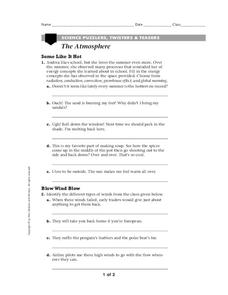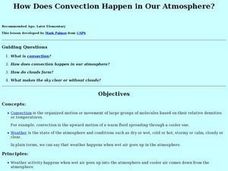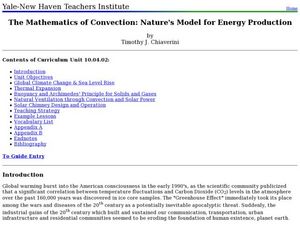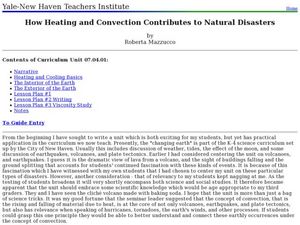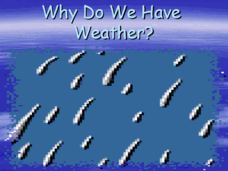Curated OER
The Earth's Atmosphere and Temperature
Students describe and compare the layers of the atmosphere. They explain how to measure the temperature of the atmosphere and discover what causes the atmosphere to heat up in some places more than in others.
Curated OER
Density Studies of the Earth
Density comes to life as investigators place soda cans into containers of various liquids to find if they sink or float. They layer different density liquids, compare densities of different gases, and more. A total of six different...
Baylor College
Moving Air
In lab groups, young scientists place aluminum cans with a bubble-solution cap into different temperatures of water to see what size of bubble dome forms. As part of an atmosphere unit in preparation for learning about convection...
Curated OER
The Atmosphere
For this atmosphere worksheet, students complete 20 fill in the blank questions about energy concepts, different types of winds, and air pollution.
Curated OER
Water, Oceans and Atmosphere
There are some really nice diagrams and facts regarding the atmosphere and regulation of energy levels in this PowerPoint. It would be wise to double-check some of the details, but these slides would provide a nice visual recap of...
Colorado State University
What Is a "Convection Cell"?
Round and round in circles it goes! A hands-on activity has learners recreate a model of a convection cell. They watch as the difference in density of their materials creates a current.
Curated OER
How Does Convection Happen in Our Atmosphere?
Learners explore convection and how it happens in the earth's atmosphere.
Curated OER
Convection Currents
In this convection current worksheet, students experiment with hot water in a beaker and a colored ice cube to demonstrate how convection currents work. They record observations and answer questions.
Curated OER
Heat Transfer In The Atmosphere
In this science worksheet, students find the meaning of radiation, conduction, and convection and how they operate in the global atmosphere.
Curated OER
The Mathematics of Convection: Nature's Model for Energy Production
High schoolers conduct a series of experiments to investigate density, buoyancy and climate. In this math lesson, pupils design and build a hot air balloon to demonstrate convection. They research and write a paper about solar chimneys.
Curated OER
Does Global Warming Increase the Intensity of Atmospheric Natural Disasters?
Students study global warming by communicating the problem, process and solutions. In this global lesson students use graphs, research and write a critical stance on natural disasters.
Curated OER
How Heating and Convection Contributes to Natural Disasters
Students study the basics of heating and cooling and how it pertains to the earth. In this global instructional activity students read the Magic Tree House book then create a chart of their findings.
Curated OER
Convection and Wind
Students use water, beakers, hot plates, paper dots, and goggles to participate in a hands on activity where they see how a convection current creates wind. In this convection current lesson plan, students participate in a hands on...
Curated OER
Simulating the Greenhouse Effect in a Terrarium
Students identify what factors effect global warming and how the greenhouse effect occurs. In this environmental lesson students view videos then complete an experiment using a terrarium to observe greenhouse gas.
Curated OER
Deep Convective Clouds
Students observe clouds. In this deep convective clouds instructional activity, students analyze cloud data recorded over one month and draw conclusions based on results. Students predict "Thunderstorm Season" and prepare to defend...
Curated OER
A Comparison of Cloud Coverage over Africa
Students identify different climate regions and local weather patterns. In this cloud coverage lesson students use NASA satellite data and import it into Excel.
Space Awareness
The Intertropical Convergence Zone
Young scientists know it is hotter along the equator, but why is it also rainier? Through the process of completing two experiments and a worksheet, scholars discover the answer is the intertropical convergence zone. First, they...
Curated OER
Why Do We Have Weather?
Convection is offered as the reason behind our weather phenomena. This presentation assumes that viewers are familiar with the methods of heat transfer, and is therefore more geared toward middle-school meteorologists. The focus is on...
University of Texas
Heat Transfer and Energy Balance
Learn about conduction, convection, and radiation with an illustrative presentation. It includes slides about atmospheric movement and how it affects the climate, solar radiation, and how latent heat can form storms.
Curated OER
Ocean Streams
The instructions for demonstrating ocean turnover are provided in this resource. You could set this up for your earth science class as part of a lecture on convection currents or as an explanation of how ocean currents form. An animation...
Curated OER
Surface Air Temperature Trends of the Caribbean
Students use real satellite data to determine the changes in near-surface air temperature at different times of the year over the Caribbean Sea. They discover how Earth's tilt causes seasonal differences in incoming solar energy. They...
NOAA
A Laboratory Simulation of Ocean Surface Currents
Stimulate interest in ocean currents with a simulation. The first installment of a five-part middle school series teaches future oceanographers about the forces that interact to cause ocean currents. A simulation shows how wind and...
Curated OER
Heating the Atmosphere
Students construct a thermograph for maximum and minimum temperatures for the 2-week period. They illustrate how the earth's atmosphere is heated by convection and conduction currents and evaporation of water.
Curated OER
What's the Connection Between Convection and Inversion?
Ninth graders observe a simulation demonstrating the difference between convection and inversion. They explain where and when convection and inversion layers occur and how each impacts air quality, and by connection, human health.





